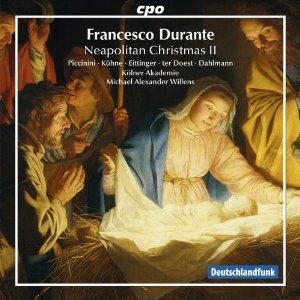
It's been eight years since I wrote about my favorite classical Christmas music. So here's a look at some of the finer Christmas releases since then. As before, I try to spotlight some less familiar Christmas music while still including old favorites.
Monica Piccinini/Christina Kuhne/Ursula Eittinger/Alberto ter Doest/Thilo Dahlmann/Cologne Academy/Michael Alexander Willens
Francesco Durante: Neapolitan Music for Christmas II
(cpo)
I've got to get my hands on vol. I, because this is wonderful. Durante (1784-1755, an almost exact contemporary of J.S. Bach, was considered one of the greatest church composers in Naples at that time, and also taught such future famous opera composers as Pergolesi and Paisiello (Durante was himself a student, in Rome, of Pasquini). Even Bach, always interested in the Italian masters, found Durante's work worthy of study. One of the tropes of Italian Christmas music was a pastoral mood celebrating the shepherds, its style typified by gently undulating 12/8 rhythms, and this program opens with Durante's charming five-movement Pastorale motet "Cito Pastores" (like everything here, in Latin). His "Laudate pueri 'breve'" is a light-hearted setting of Psalm 113. The Litany for Two Voices and Violins in E minor, for soprano, alto, two violins, and basso continuo, is a setting of the litany of the Blessed Virgin Mary known as the Loreto litany. Piccinini and Eittinger entwine their voices to take full advantage of this luscious dollop of melody, which prepares us for the sweetnesses of the Kyrie-Gloria Mass "In Afflictionis tempore" (In time of trouble). Yes, even when portraying pathos, Durante's style is richly voluptuous. There's a happy ending, too, so it's not all suffering.
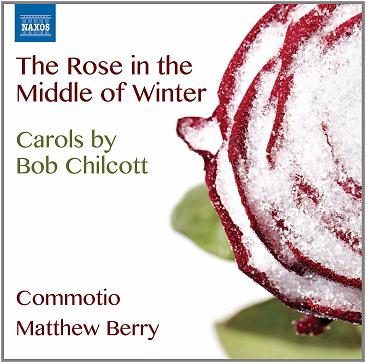
Commotio/Matthew Berry
The Rose in the Middle of Winter: Carols by Bob Chilcott
(Naxos)
Prolific British choral composer Bob Chilcott writes in a thoroughly tonal, highly mellifluous style (Naxos released a non-seasonal choral collection, Everyone Sang, earlier this year). This well-packed CD (79:31) mixes original compositions, lush arrangements of familiar carols, and a few drastic rewrites (even familiar words with new melodies). The variety of instrumentation, from a cappella to organ accompaniment to sprinklings of other instruments (flute, soprano sax, oboe, harp) keeps the tracks from blending together. It's all very sweet, but holiday calories don't count, right? And if you want unfamiliar, well, most of the tracks here are first recordings, most notably the closer, which combines Emily Dickinson's "Before the ice" and the liturgical text "O magnum mysterium" (O great mystery). I am quite fond of "O magnum mysterium," having done my own setting, so his shaped up in my mind as something of a test: Could Chilcott live up to these wonderful texts? He rises to the occasion with the most haunting composition on this album, capturing well the appropriate awestruck mood.
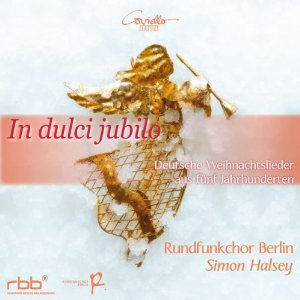
Berlin Radio Choir/Simon Halsey
In dulci jubilo: Five Centuries of German Christmas Songs
(Coviello Classics)
For German listeners, probably most or all of this album's 24 hymns, chorales, and carols are familiar, but for us Americans it all depends on whether Bach used a chorale melody, or if they showed up in translation in an American hymnal, as happened with Michael Praetorius's ever-popular "Es ist ein Ros entsprungen" (which we sing as "Lo, How a Rose E'er Blooming"). Occasionally there's a fancy arrangement by Max Reger for variety, or a five- or six-voice harmonization from the 16th or 17th century, but mostly these are the traditional harmonizations, so touching in their austere simplicity. The 63-singer Rundfunkchor Berlin, arguably the best large, non-denominational choir in the world, blends beautifully.
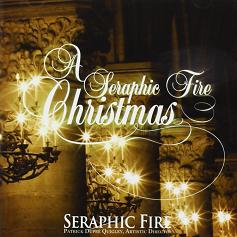
Seraphic Fire/Patrick Dupre Quigley
A Seraphic Fire Christmas
(Seraphic Fire Media)
On the other hand, if you crave familiarity but still want a tasteful presentation, this Florida adult choir, which is as polished as any American group on record nowadays, provides an impeccable program. There's one curveball, the original plainchant version of "Adeste Fideles" instead of the hymnic harmonization we all know, and a few modern classics -- Morton Lauridsen's "O magnum mysterium," the late slightly unsettling John Tavener's "The Lamb," Elizabeth Poston's "Jesus Christ the Apple Tree," and Frank Tichelli's gorgeous "There Will Be Rest." The rest are chant (all near the beginning), the ever-popular Praetorius's "Es is ein Ros," and classy arrangements (by John Rutter, David Willcocks, and this ensemble's conductor, Patrick Dupre Quigley) of familiar hymns and carols. This is "comfort music" done right.
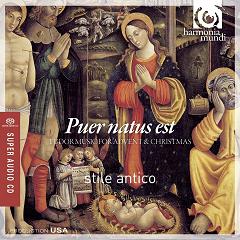
Stile Antico
Puer natus est: Tudor Music for Advent & Christmas
(Harmonia Mundi)
For a change, a holiday release that admits the difference between Christmas proper and Advent, the church season leading up to it -- though they lose credit by then going ahead and interspersing the surviving movements of Thomas Tallis's Missa Puer natus est, a Christmas mass if there ever was one (it's based on the chant of the same name, also included of course, which is the introit for Christmas Day Mass). This is a British choir, and the music is also, as the title makes further clear, all (aside from the chant) British: the aforementioned Tallis (c.1505-1585), "Audivi vocem de caelo" by John Taverner (c.1490-1545), four Propers from his 1605 Gradualia by William Byrd (c.1540-1623), a Magnificat (my favorite of the works here) by Robert White (c.1538-1574), and "Verbum caro" by John Sheppard (c.1515-1558). This is masterful polyphony of soaring majesty and stunning beauty, and this relatively new choir delivers it in aptly smooth renditions, captured with brilliant clarity in a nicely reverberant space.

 Commotio/Matthew Berry
Commotio/Matthew Berry Berlin Radio Choir/Simon Halsey
Berlin Radio Choir/Simon Halsey Seraphic Fire/Patrick Dupre Quigley
Seraphic Fire/Patrick Dupre Quigley Stile Antico
Stile Antico